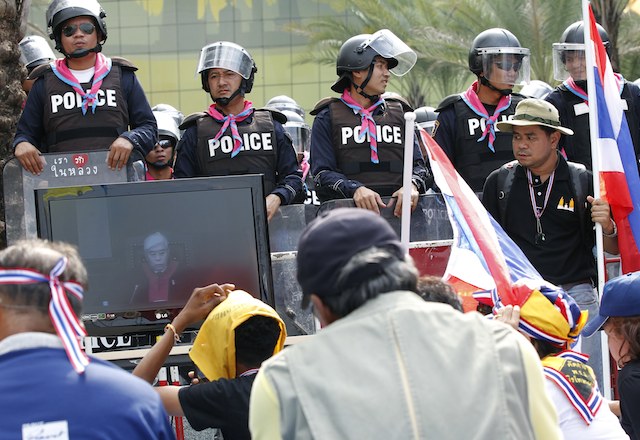SUMMARY
This is AI generated summarization, which may have errors. For context, always refer to the full article.

BANGKOK, Thailand – Thailand’s ruling party escaped punishment in a Constitutional Court ruling Wednesday, November 20, that had threatened to inflame the country’s divisions as political rivals rallied in Bangkok.
The judgement, which frustrated a government bid to establish a fully elected upper house, had been keenly anticipated, with thousands of pro- and anti-government protesters massing in the capital.
Bangkok has been the scene of periodic outbreaks of street violence in recent years and the ruling had fueled fears of renewed political unrest.
Judges slammed Prime Minister Yingluck Shinawatra’s Puea Thai party for driving through a proposed change to the constitution which was drawn up under the military junta that deposed her divisive brother Thaksin.
They called the proposed amendment “unconstitutional”.
But the nine-strong bench stopped short of moving to punish the party, and dismissed a petition to dissolve Puea Thai and its coalition partners.
Any move against the ruling party would probably have enraged the government’s supporters, including the pro-Thaksin “Red Shirts” who have massed in their thousands since Tuesday in a stadium in the city suburbs.
The court’s decision was initially given a partial welcome by both sides of Thailand’s political divide, in a sign that it may have eased immediate tensions.
A lawyer for the opposition Democrat Party meanwhile said the ruling should trigger the resignation of the under-fire premier.
“The amendment, which was not based on rule of law, but to benefit of specific people, cannot go through,” said Virat Karlayasiri.
The Red Shirts expressed relief that the ruling party had not been disbanded, but slammed the court’s ruling against the amendment.
“If we cannot amend one article, how about the whole constitution?” said Red Shirt leader Jatuporn Prompan.
Judicial rulings have played a key role in Thailand since a 2006 coup that deposed Thaksin and unleashed an era of sometimes bloody political turbulence.
Two pro-Thaksin premiers were forced from office in 2008 by such rulings, making way for the opposition Democrat Party, which is backed by the military and Bangkok’s elite, to take power in a parliamentary vote.
The scuppered constitutional amendment to make the upper house fully elected would have returned the senate to its structure before the 2006 coup.
Analyst Thitinan Pongsudhirak, of Bangkok’s Chulalongkorn University, said the 2007 constitution was crafted to rebalance power structures away from the executive, by shifting more authority to the judiciary and making around half the senate appointed.
“The verdict overall puts the Constitutional Court into the opposition camp by effectively keeping the half-appointed senate intact,” he told Agence France-Presse.
He added that the “Thai conflict has deepened institutionally”, with a stalemate between the ruling party on one side and the opposition and part-appointed senate on the other.
“This is not a long-term settlement by any means. It’s a short-term path, a very temporary ceasefire. But the battle between the two sides is going to continue,” he said.
The political temperature is already high after a controversial amnesty plan prompted opposition rallies in Bangkok over fears it would have allowed Thaksin’s return from self-imposed exile.
The amnesty bill was rejected by a senate vote last week. But the anti-government rallies have persisted for a third week, although numbers have reduced to a few thousand over recent days.
Thaksin, a telecoms tycoon-turned-politician, has a strong electoral base, with ardent support from many in the countryside and the working class in general for a range of popular policies.
But he is loathed by the Bangkok elite and middle class, who accuse him of corruption.
Puea Thai swept to power in 2011 on a wave of support for Thaksin following deadly 2010 Red Shirt street protests, which were crushed in a bloody military crackdown under the then Democrat-led government. – Rappler.com
Add a comment
How does this make you feel?
There are no comments yet. Add your comment to start the conversation.